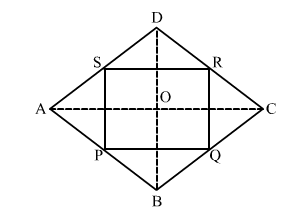Question:
Find the area of a figure formed by joining the midpoints of the adjacent sides of a rhombus with diagonals 12 cm and 16 cm.
Solution:

Let ABCD be a rhombus and P, Q, R and S be the midpoints of AB, BC, CD and DA, respectively.
Join the diagonals, AC and BD.
In ∆ ABC, we have:
$P Q \| A C$ and $P Q=\frac{1}{2} A C$ [By midpoint theorem]
$\mathrm{PQ}=\frac{1}{2} \times 16=8 \mathrm{~cm}$
Again, in ∆DAC, the points S and R are the midpoints of AD and DC, respectively.
$\therefore S R \| A C$ and $S R=\frac{1}{2} A C$ [By midpoint theorem]
$\mathrm{SR}=\frac{1}{2} \times 12=6 \mathrm{~cm}$
Area of PQRS $=$ length $\times$ breadth $=6 \times 8=48 \mathrm{~cm}^{2}$
